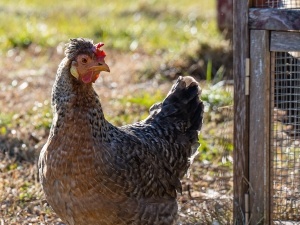
Maintaining healthy chickens is quite straightforward, all these birds really need is good food, clean water, and, a clean environment.
That being said, your birds can still become sick very easily. If your bird is shaking its head and opening its mouth then there is something wrong with the bird
Table of Contents
Chicken shaking head and opening mouth:
A variety of ailments and illnesses can affect your chickens. These birds are very susceptible to becoming sick. If your bird is shaking its head and opening its mouth then your bird may have gapeworm.
What is gapeworm?
Gapeworm is a serious and common parasitic condition that affects chickens and other domestic and wild birds.
Gapeworms are tiny red roundworms that can attach to the bird’s trachea and feed on the bird’s blood.
The worms may settle in the bird’s trachea, and restrict airflow or, they may travel to and settle in the bird’s lungs where they will worsen the birds breathing.
This condition causes chickens to shake their heads in an effort to dislodge the worms from their throat. The infected birds will open their mouths gasping for air.
If some of the worms pass through the bird’s throat then they will be passed on with the bird’s feces. Your bird may also cough some of the worms out.
This ailment can affect chickens of all ages but pullets who are under 8 weeks old are the most susceptible to contracting gapeworm
Smaller birds, like younger birds, and small bird breeds like bantam chickens, will be more severely affected by these worms because they have smaller tracheas.
The worms will more easily obstruct, and even close off, the trachea of a small bird because the trachea of small birds is so small. More worms will be needed to obstruct a larger bird’s trachea.
How its spread:
The gapeworm parasite can infect birds who eat infected gapeworm hosts like slugs, earthworms, or snails.
Your birds can also be directly infected if the birds eat gapeworm larvae. Gapeworm larvae, can contaminate water sources, chicken feed as well as the surrounding environment like grass or soil.
Other symptoms of gapeworm:
In addition to the bird shaking its head and closing its mouth, other symptoms of gapeworms in chickens include:
- Coughing
- Making gurgling noises
- Gaping when the bird breathes
- Standing with her mouth gaped
- A reduced feed intake
- Partial or complete trachea obstruction
The symptoms shown in chickens who have a gapeworm infection are similar to the symptoms of a respiratory infection in chickens. Your bird may have a respiratory infection if your property is not infected with gapeworms.
Symptoms that your bird will show if it has a respiratory infection, include nasal discharge, congested phlegmy sounds coming from the chest, and sneezing. A bird with gapeworm will not have these symptoms.
Treating gapeworm:
There are a variety of ways to treat gapeworm in chickens, both natural and artificial remedies will help.
If you’re wanting to go the natural route then you can give natural dewormers to your birds to get rid of their gapeworms.
Giving the bird VetRx, along with the natural wormer, will treat your bird’s gapeworm problem.
You can also treat the birds using Albendazole, Fenbendazole, Flubenol, Levamisole, Ivermectin, and Aviverm (this is recommended for larger birds)
If one of your birds starts to show signs of a gapeworm infection then you’d need to treat the whole flock. Other members of the flock may be carrying this parasite but may not be showing any symptoms.
If your birds are allowed to free range, and there are worms on your property that carry the gapeworm parasite, then you’d need to keep your birds from free-feeding as a way to keep them from contracting this disease.
You’d also need to treat the property to get rid of slugs, earthworms, and snails
Adding items like diatomaceous earth, freshly minced garlic and apple cider vinegar to your bird’s food will help keep this infection at bay in healthy birds.
If this disease isn’t treated, then the worms will reproduce and accumulate in the bird’s trachea. If the worms block the bird’s trachea then the birds will die of suffocation
If you enjoyed this article then you may also be interested in other chicken related articles. Here are some articles that you may be interested in: Home Remedies For Chicken Eye Infection, Baby Chick Shaking Head, White Pus In Chicken Eye, Yellow Pus In Chicken Eye, Chicken Shaking Head And Closing Eyes

